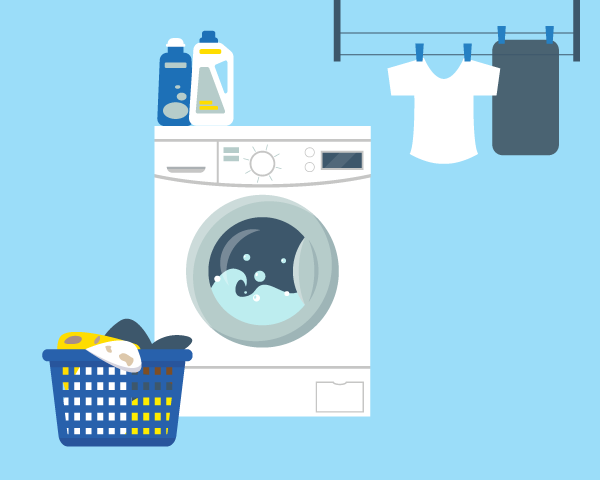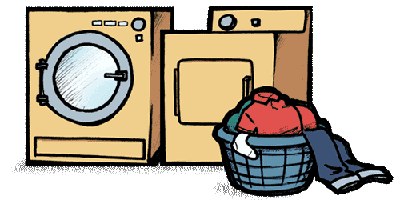
Location: Laundry Room
Mission: Save energy with the washer and dryer.
When washing, sort colors and wash full loads instead of several small loads.
If you have to wash a load that isn’t full, make sure the water setting matches your load size. Don’t use the “large” setting for a small load of clothes
When possible, run the washer and dryer at night. These units generate heat as they run, which means the air conditioner will have to work harder. Since it is naturally cooler at night, the air conditioner will not have to work as hard. During winter, the extra heat generated by the machines will help keep the house warmer.
The clothes dryer
When drying, dry full loads instead of several small loads.
Clean the lint filter after each use to maintain good airflow in the dryer and shorten drying time
Remove clothing from the dryer right away. This will keep your clothes from becoming as wrinkled, which will shorten your ironing time or may eliminate the need for ironing completely. This saves both time and electricity!
The dryer puts off heat as it dries your clothes. In the summer time, keep the laundry room door closed to prevent the dryer from heating the rest of your house. Keep the door to the laundry room open in cooler months to let the warm air from the dryer into the rest of your house; this will make your heater not have to work as hard. When possible, run the dryer at night when it is naturally cooler than in daytime. During summer, the air conditioner will not have to work as hard to offset the heat generated by the dryer. During winter, the extra heat will help heat your home.
Don’t over dry your clothes. Over drying wastes electricity and wears out your garments more quickly. Use the moisture sensor setting on your dryer if you have one. This will make the dryer automatically cut off when the clothes are dry.
Clean the dryer vent on the outside of the house regularly. Keeping the vent clean allows it to open and close properly. It must be able to open and let out air from the dryer, but still able to close when the dryer is not in use so that it can keep out cold air and bugs.

 According to the Department of Energy, almost 85% of the electricity used for washing clothes goes toward heating water. Wash in cold water whenever possible to save electricity. Even switching from hot water to warm water can save almost half the electricity, but for most loads, cold water will work fine. Using cold water can also reduce color fading on your favorite shirt!
According to the Department of Energy, almost 85% of the electricity used for washing clothes goes toward heating water. Wash in cold water whenever possible to save electricity. Even switching from hot water to warm water can save almost half the electricity, but for most loads, cold water will work fine. Using cold water can also reduce color fading on your favorite shirt! The best way to save electricity with your dryer is to use it as little as possible. Instead, hang your clothes to dry them to save electricity and make your garments last longer.
The best way to save electricity with your dryer is to use it as little as possible. Instead, hang your clothes to dry them to save electricity and make your garments last longer.